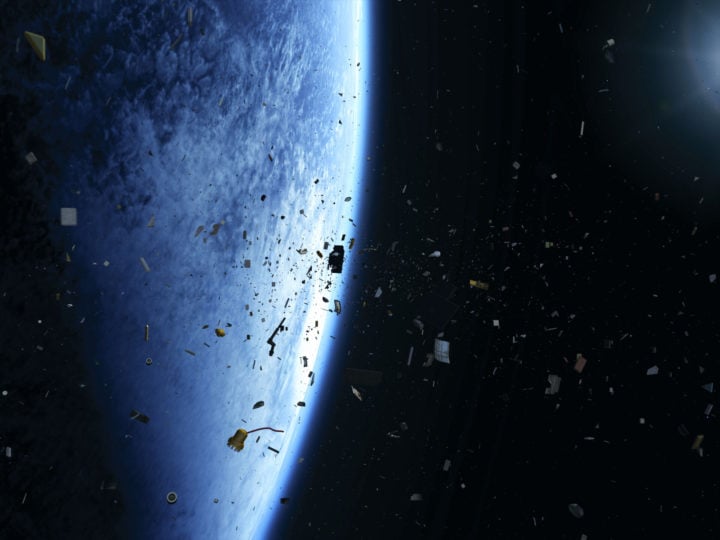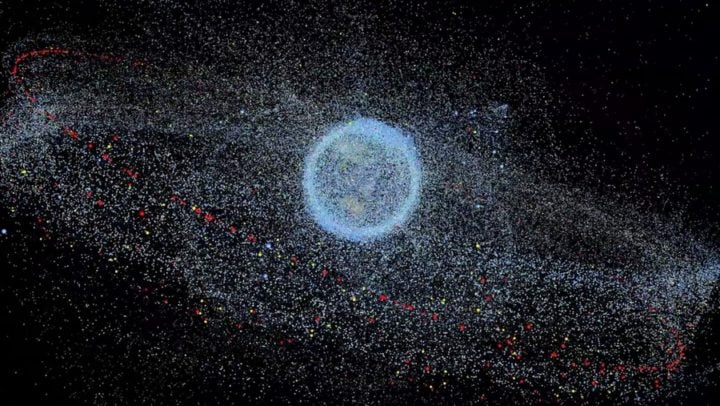More satellites were launched in the last few years than the entire six decades of space exploration. 130 million pieces of space debris larger than a millimetre orbit Earth, threatening satellites now and in the future. Once a week, a satellite or rocket body reenters uncontrolled through our atmosphere. Behaviours in space have to change.

Space debris – illustrative artistic rendering. Image credit: Spacejunk3D, LLC
Building on a decade of work carried out across the Agency, ESA has introduced its own bold internal standard to significantly limit the production of debris in Earth and Lunar orbits by 2030 for all the Agency’s future missions, programmes and activities: ESA’s ‘Zero Debris approach’.
But space exploration is a global endeavour for the shared benefit of humankind, and the long-term sustainability of space will require action and change from all. ESA is facilitating the Zero Debris Charter: a global initiative for all space entities to sign and follow towards the shared goal of a Zero Debris future.
After months of intense and fast-paced collective effort, the Zero Debris Charter has been finalised.
“As space infrastructure has become the backbone of our modern society, the proliferation of space debris is threatening our way of life. Now is the time to act as a community to channel our collective efforts,” said ESA Director General Josef Aschbacher.
“To implement the Zero Debris Charter, ESA will focus on developing ground-breaking technologies for satellite end-of-life disposal, in-orbit servicing and active debris removal. In addition, ESA will work hand-in-hand with institutions in charge of regulatory aspects.”
The 2023 Space Summit in Seville marks the opening of the period of registration of intent to sign the Zero Debris Charter.

Millions of objects created by humans orbit the Earth, creating a need for innovation to protect the space environment. Image courtesy of the European Space Agency.
Zero Debris by 2030
In 2022, ESA Member States encouraged the Agency to implement “a Zero Debris approach for its missions; and to encourage partners and other actors to pursue similar paths”. ESA is undergoing a profound internal transformation to mitigate the creation of space debris and remedy what’s already up there by 2030, through its Zero Debris approach.
From designing and building new missions to flying and responsibly disposing of them, ESA’s Zero Debris approach is seeing a bold new standard that will apply to all ESA missions and partnerships from 2030, with continual advancements and improvements in the years before.
But the space debris problem is a global one, and the Zero Debris Charter is the first initiative of its kind to bring together the largest array and variety of space actors around the world with the joint goal of creating no more space debris by 2030 and making possible the long-term sustainability of space activities.
More than 40 organisations have actively engaged in the open and collaborative development of the Charter, now released and ready for signatures from “any entity demonstrating a strong commitment to advancing space safety and sustainability”: join the Zero Debris Community and play a vital role in shaping the global response to the space debris problem.
By gathering a wide array of space entities to define ambitious and measurable space debris mitigation and remediation targets for 2030, the Zero Debris Charter has already:
- Built a diverse community of actors in Europe and beyond, committed to further advancing space safety and sustainability, including industrial players of all sizes, government agencies, international organisations, universities and research centres, non-profit foundations and more.
- Developed a precise and common vision of space sustainability for 2030 – combining far-reaching guiding principles and highly ambitious yet realistic technical targets on which to build an ambitious Zero Debris roadmap, driving global space debris mitigation and remediation efforts.
“We are delighted that the Charter was finalised on 16 October 2023 and released today, at the occasion of the Space Summit 2023,” explains Quentin Verspieren, Protect Accelerator Coordinator.
“Based on a draft proposed by ESA, we have analysed, debated and rewritten every single line of the Charter through a fully open and collaborative process. Beyond having converged on such an ambitious document in record time, our exchanges revealed a strong consensus in Europe and beyond on the need to go further than existing space safety and sustainability practices.”
And the Zero Debris Charter is just only the beginning, the starting point for ambitious, collective activities that will build the technologies, new economies and policies required to make Zero Debris a reality.
Join the Zero Debris Community
Space actors are invited to register their intent to sign up to the Zero Debris Charter, here. Once interested entities have confirmed their intent, signing ceremonies will be held in the first half of 2024.
Find out more about ESA’s Zero Debris Approach, check out the Zero Debris Charter FAQ.
Source: European Space Agency

